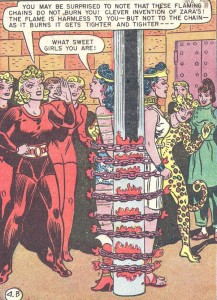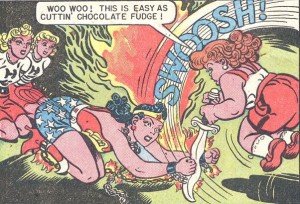My introduction to Wonder Woman was not the original Marston/Peters comics. I’m not sure what my first exposure to Wonder Woman was, and it almost seems like I became aware of the character through cultural absorption. As a kid, I saw a few snippets of the TV series with Lynda Carter, I read a few DC comics featuring Wonder Woman (but not her own title), I watched the Justice League cartoon, and played a few superhero video games. I don’t remember which piece of entertainment came first. What I do remember is that my fanboy brain had already constructed the “ideal” Wonder Woman long before I ever picked up a Wonder Woman comic. In other words, I was a Wonder Woman fan but not a Wonder Woman fan.
And therein lay the roots for so much of my dissatisfaction with the character. It would be easy to say that I dislike Wonder Woman comics because they suck. Well … most of them do kinda suck (the less said about the current run, the better), but I’ve put up with sucky comics in other circumstances (X-Men, I’m looking in your direction). But Wonder Woman comics always provoked a hostile reaction from me. Even the runs that were supposed to be good (according to the Internet hive-mind) failed to measure up to my standards. George Perez? Meh. Greg Rucka? Terrible. Gail Simone? Tiresome. They were never going to be as good as “my” Wonder Woman, so why bother?
I first read a collection of Marston stories about four years ago, well after I had formed my views on Wonder Woman. Needless to say, it was like nothing I had ever read in superhero comics. Bondage, cross-dressing, and lesbian subtext in a comic marketed to children! It was idiosyncratic, to put it mildly.
It was obsessive, fetishistic, and outright insane, to put it less mildly. And it was fantastic! Most superhero comics aspire to little more than genre hackery, and many fail to measure up to even that lowly bar. But Marston’s Wonder Woman was a personal and ideological work. Regardless of what one thinks of Marston’s values, his comic stands out as a rare artistic achievement in mainstream comics, a fusion of radical feminism, patriotism, BDSM, and commercialism.
Regardless of its strengths, I should have hated this comic, considering how different it was from my vision of Wonder Woman. Why is she getting tied up all the time? Why does she say ridiculous things like “Suffering Sappho?” What’s with the giant kangaroos? Etta Candy … what the fuck?
But I couldn’t find fault with Marston, as much as my ego wanted to, because his Wonder Woman was far better than mine (or any other version of Wonder Woman I had encountered). My Wonder Woman was nothing more than a grab-bag of traits: She’s strong (but not mannish)! She’s fierce (but not in a mean way)! She’s smart (but not nerdy)! She’s sexy (but not trampy)! I hadn’t created the perfect version of Wonder Woman, instead I’d assembled a highlight reel from every comic, TV series, or game featuring the character. And when I pasted these traits together they amounted to nothing more than another bland, inoffensive superhero. Marston’s Wonder Woman was born out of actual ideas. Those ideas were crazy (and occasionally creepy), but there was genuine thought and creativity behind his stories. Nothing I dreamed up has ever come close.
When I was younger, I tended to judge the quality of a work by how thoroughly it pandered to my tastes. If something hit the correct fanboy buttons in my brain, it was deemed good. Marston’s Wonder Woman failed the “fanboy test” in almost every way, but I came around to appreciating the work. And the more I appreciated Wonder Woman, the more I came to realize that my particular vision of the character (and comics in general) was fandom at its most banal. I won’t go so far as to say that reading Wonder Woman triggered an epiphany. Around the same time I was reading Marston I was also reading Moore, Ware, and a dozen other great comic creators. But Wonder Woman was one of the first comics that stifled my inner fanboy and forced me to reevaluate my standards for comics and other media.
I’m still not entirely immune to the siren call of slick genre product, but I have an easier time distinguishing mindless fun from great art. And I understand now that “good” doesn’t mean “identical to the tastes I had as a teenager.” So thank you for that, William Marston.
_____________
The entire roundtable on the Marston/Peter Wonder Woman is here.



So did you find Marston/Peter because of me? Or did you stumble on them on your own?
I’d read a few of the classic Wonder Woman comics before you started Bound to Blog (though the timing was close). It was part of my “branching out” phase when I returned to reading comics. But after you started Bound to Blog I went back and read more of the Marston/Peters run to fill in the gaps.
I suppose I should thank you for writing the Bound to Blog series. It was a lot of fun to read, and pushed me to think critically about these comics.
Criticism of Etta Candy will not be tolerated
Hey, Etta has grown on me. Who doesn’t like candy?